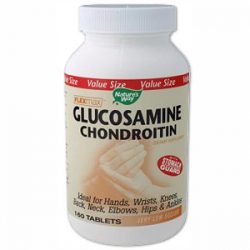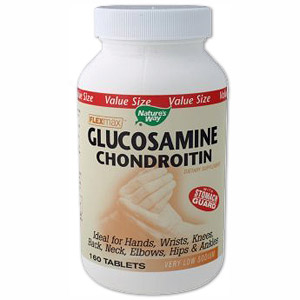Glucosamine with Chondroitin is an excellent supplement for joint health. Its function is to draw fluid into the joint and lubricate it. Please check with your doctor if you are currently on any medications before taking it.
Glucosamine, chondroitin sulfate, and MSM (methylsulfonylmethane) occur naturally in the body.
Where do Glucosamine and Chondroitin Come From?
 The glucosamine used in supplements is typically derived from the shells of crabs although a corn source is also available.
The glucosamine used in supplements is typically derived from the shells of crabs although a corn source is also available.
Glucosamine is available in a variety of chemical forms, such as glucosamine hydrochloride and glucosamine sulfate. These vary in terms of the amount of actual glucosamine available for use in the body from an equal of each form (See ConsumerTipâ„¢ for Glucosamine for more information).
Chondroitin sulfate is generally derived from cow cartilage, but porcine (pig) and even chicken cartilage has been used and algae are another potential source. MSM is synthetically produced.
What Glucosamine and Chondroitin does
Glucosamine and chondroitin sulfate supplements are used to slow the progression of osteoarthritis the deterioration of cartilage between joint bones and to reduce the associated pain.
Glucosamine is thought to promote the formation and repair of cartilage. Chondroitin is believed to promote water retention and elasticity in cartilage and inhibit enzymes that break down cartilage.
In veterinary medicine, glucosamine and chondroitin, often in combination, are commonly used in the treatment of degenerative joint disease typically in older dogs and cats as well as in horses.
What MSM does for you Joints
MSM is used primarily for treating pain associated with osteoarthritis and has been proposed for treating other conditions including rheumatoid arthritis, inflammation of the bladder wall (interstitial cystitis), snoring, muscle spasm, and cancer.
All of these uses for MSM, including those for arthritis, are based on limited research, so its effectiveness hasn’t been well established.
Many additional claims are found on MSM products, including skin-softening and nail-strengthening effects, but none of these are well supported by research. As a veterinary medicine, MSM is used to treat muscle and tendon soreness and inflammation in horses.
The mechanism by which MSM may work isn’t well understood, although it’s known to contribute sulfur to the body, which can then be used to synthesize certain amino acids (building blocks for proteins), and it can act as an antioxidant. MSM is also used in veterinary medicine to treat pain and inflammation, but its effectiveness has not been well studied.



